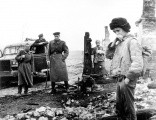
World War II: 60 Years After 2005 / Ivanovo dětstvo / USSR 1962
Ivan is one of many war orphans, yet he is exceptional in that he decides to enter the ranks of the Red Army in order to do reconnaissance work, although he is barely an adult. The boy indeed manages to perform some truly heroic deeds, but he refuses to return to school. The war has taken away his home and his childhood, and his desire for revenge grows with the approaching front.

Little Ivan, aged 12, is one of many war orphans, yet he is exceptional in that he decides to enter the ranks of the Red Army in order to do reconnaissance work, although he is hardly an adult. The boy indeed manages to perform some truly heroic deeds, but he refuses to return to school. The war has taken his mother, father, his home and his childhood. As the front approaches, his desire for revenge only grows. In his poetic image of the war, whose barbarity is seen through the eyes of a child, the director does away with naturalistic shots, instead opting for lyrical motifs which he contrasts cruelly with the bedlam of war. Ivan is of slight build, yet he fulfils his tasks with great earnestness. His eyes are full of grief and also inexorability. It is only in his dreams that he allows himself to return to the magical landscape of his childhood, where everything is harmonious and where he can encounter his mother once more on the sea shore. Ivan’s Childhood presents an unusually faithful report from the front.
90 min / Black & white, 35 mm
Director Andrey Tarkovsky
/ Screenplay Vladimir Bogomolov, Michail Papava/Mikhail Papava
/ Dir. of Photography Vadim Jusov
/ Music Vjačeslav Ovčinnikov/Viacheslav Ovchinnikov
/ Editor Ljudmila Fejginova/Lyudmila Feiginova
/ Cast Nikolaj Burljajev/Nikolai Burlyayev, Valentin Zubkov, Jevgenij Žarikov/Yevgeni Zharikov
/ Contact Národní filmový archiv

Andrei Tarkovsky (1932, Zavrazhe-1986, Paris) studied Moscow’s Film School (VGIK) under Michail Romm. He began his directing career with the medium-length feature film The Steamroller and the Violin (Katok i skripka, 1961). His debut feature, Ivan’s Childhood (Ivanovo dyetstvo, 1962), won the Grand Prix at the Venice IFF. In 1966 he completed his historical fresco Andrei Roublev (Andrei Rublyov), on the life of the legendary icon-painter from the 15th century. His film Solaris (1971) was based on the book by Stanisław Lem, he wrote his own screenplay for the autobiographical The Mirror (Zerkalo, 1975), and Stalker was based on a work by Arkadi and Boris Strugatsky (1978). After this, Tarkovsky worked in exile, which gave his work undertones of existential feelings of sorrow and nostalgia for his native country: in Italy he made another film with an autobiographical slant, Nostalgia (1983), and in Sweden a work based again on his own script, The Sacrifice (Ofret, 1985), leading to a spiritual catharsis.
Národní filmový archiv
Závišova 5, 140 00, Praha 4
Czech Republic
E-mail: [email protected]

Briana Čechová
Film Institution Rep.
First-hand brews throughout the year.
Be among the first to learn about upcoming events and other news. We only send the newsletter when we have something to say.